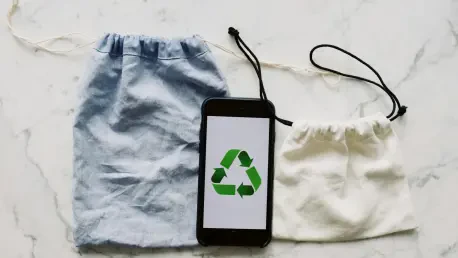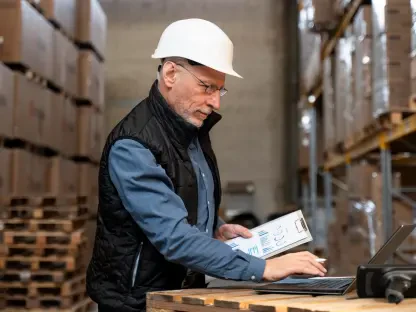With decades of experience spanning across the logistics industry, including supply chain and delivery, Rohit Laila has been a driving force in adapting technology and innovation within the sector. His deep-rooted passion for sustainable packaging and logistics shines through as he discusses the evolving landscape of packaging strategies aimed at reducing environmental impacts and fostering societal benefits.
What inspired the creation of Armour Wrap ECO, and how does it differ from traditional pallet wraps?
Armour Wrap ECO emerged as a response to the critical need for more sustainable packaging solutions. Unlike traditional pallet wraps that often contribute to landfill and require specialized disposal methods, Armour Wrap ECO is crafted from 100% post-consumer recycled content and is fully kerbside recyclable. The goal was to leverage recycled materials to transform plastic waste into something not only useful but also environmentally responsible.
Can you explain the process of making Armour Wrap ECO from 100% post-consumer recycled content?
The process involves collecting post-consumer plastic waste and converting it into high-performance pallet wraps through advanced recycling techniques. This ensures that every roll of Armour Wrap ECO is giving a new lease of life to previously discarded materials, significantly reducing the environmental footprint compared to conventional wraps.
How does Armour Wrap ECO impact cost reduction for businesses using it?
Using Armour Wrap ECO can lead to substantial cost reductions for businesses. The recyclable nature means that companies can save on waste disposal costs, while the use of recycled materials can often be more economical than virgin plastics. Additionally, it enhances brand value by aligning with eco-conscious consumer preferences, thus potentially driving market share and customer loyalty.
What environmental benefits can companies expect from switching to Armour Wrap ECO?
By opting for Armour Wrap ECO, companies can expect a myriad of environmental benefits, including a reduction in landfill waste and decreased reliance on fossil fuels for creating virgin plastic wraps. Furthermore, its recyclable nature supports the circular economy, ensuring the wraps are repurposed post-use rather than contributing to pollution.
How important is it for packaging to be kerbside recyclable, and what challenges does this address?
Kerbside recyclability is crucial because it promotes ease of recycling, directly tackling the problem of specialized disposal and segregated waste streams that many traditional wraps require. This feature simplifies the recycling process for consumers and businesses, significantly enhancing participation in sustainable practices.
What kind of feedback has Springpack received from users of Armour Wrap ECO?
Feedback has been overwhelmingly positive. Users appreciate the performance of Armour Wrap ECO, which matches or even exceeds traditional wraps, and its sustainable credentials are a major selling point for environmentally conscious businesses. Many report improved customer perceptions and greater engagement in sustainable initiatives.
Can you provide more details about the Pride of Yorkshire art trail and its significance?
Pride of Yorkshire is a magnificent celebration slated for 2026, designed to commemorate 150 years of Sheffield Children’s with a vibrant public art display. It will feature striking lion sculptures throughout South Yorkshire, reflecting community spirit, artistic collaboration, and the importance of supporting life-changing care at the hospital.
How does the involvement of the Loadhog Foundation as the headline sponsor impact the Pride of Yorkshire initiative?
The Loadhog Foundation’s sponsorship provides the necessary support and visibility to make the Pride of Yorkshire initiative a grand success. Their involvement underscores a commitment to community engagement and philanthropy, helping to amplify the event’s message and mobilize further support for Sheffield Children’s hospital.
What impact did the Bears of Sheffield project have on the community, and how will Pride of Yorkshire build on that?
The Bears of Sheffield project left a lasting impression by fostering community involvement and raising significant funds for a noble cause. Pride of Yorkshire aims to build on this legacy by uniting even more stakeholders—businesses, artists, schools—and broadening the scope and impact through larger-scale participation and engagement.
What are the main features of the Pratika fully automatic l-sealers recently installed by the pharmaceutical industry producer?
These Pratika l-sealers represent cutting-edge technology, capable of processing up to 40 packs per minute, thereby significantly enhancing packaging capacity and operational efficiency for the pharmaceutical industry. This advancement supports better scalability and production responsiveness, essential for meeting high-demand scenarios.
How has the new equipment from Yorkshire Packaging Systems improved the pharmaceutical producer’s packaging capacity?
The recent upgrades have notably increased throughput and streamlined processes within the producer’s packaging lines. By automating key functions, the capacity has grown substantially, allowing the producer to better manage supply chain demands and operate at an optimal level, effectively meeting growing consumer needs.
What are the key upcoming changes in the European and UK packaging regulations that Tosca’s webinars address?
Tosca’s webinars have been pivotal in outlining significant regulatory changes, particularly focusing on the European Union and UK’s evolving packaging and waste regulations, including new compliance frameworks such as the PPWR and EPR. These initiatives are reshaping the landscape, emphasizing sustainability and reuse.
How do Tosca’s webinars support businesses in staying compliant with the new EU Packaging and Packaging Waste Regulation?
Through these expertly led webinars, Tosca provides valuable insights and practical strategies for businesses to navigate and adhere to new regulations efficiently. They cover critical aspects of compliance and sustainability, ensuring companies can transition smoothly and remain aligned with legislative requirements.
Can you share insights from the webinars on the role of reuse in meeting Extended Producer Responsibility (EPR) requirements?
Reuse is a cornerstone of how businesses can meet EPR requirements effectively. Tosca’s webinars stress the importance of developing reuse systems and infrastructures that lower waste generation and increase product lifecycle. This approach not only complies with regulations but also enhances ecological and economic efficiency.
In your view, what is the current state of innovation in the packaging industry, particularly concerning sustainability?
Innovation in packaging is thriving, with sustainability taking center stage. Companies are increasingly focusing on eco-friendly designs, recyclable materials, and closed-loop systems that prioritize environmental protection and resource efficiency, driving a significant shift towards greener, smarter packaging solutions.
How do you foresee sustainable innovations impacting businesses’ long-term strategies for packaging?
Sustainable innovation is transforming the long-term strategies of businesses, making them more resilient to regulatory changes and consumer demands. As sustainability becomes integral, businesses are expected to weave it into their core operations, leading to improved competitive advantage, reduced costs, and heightened brand loyalty.
Do you have any advice for our readers?
Embrace sustainability as a core business principle rather than a supplementary activity. The transition to sustainable packaging and practices not only benefits the environment but also strengthens business resilience, aligns with evolving consumer preferences, and promotes long-term growth.









